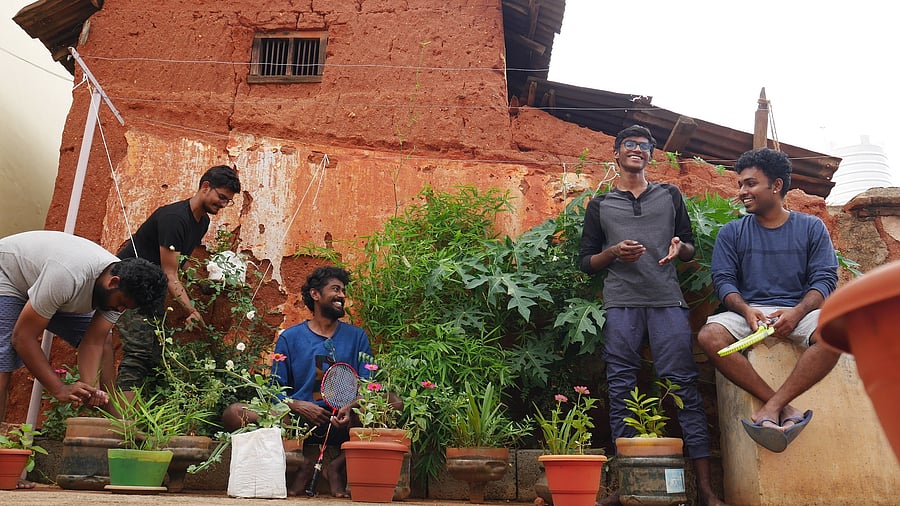
As work-from-home continues, many professionals are seeking new places to work from. The more affluent are looking at the possibility of investing in farm plots and collectives, and working from their own properties in the lap of nature. Giridhara Madakashira, senior vice-president-technology, with an MNC, decided to spend a few days at his farm during the first week of December. Back in 2019, he had decided to invest with Hosachiguru, a company that allows people to buy a piece of farmland and take up agriculture.
“I grew up in a small town on the banks of the Kapila near Mysuru. Farming was a part of my everyday life until we moved to the city. I had always wanted my daughter to experience that life,” he says.
However, back then customers would simply visit the farm over the weekend. “During the pandemic, people who owned a piece of our farmland had the option of staying on in the city or going back home. Many of our customers felt comfortable staying at our farms,” says Srinath Setty, director, Hosachiguru, whose farms are located in Abhivrudhi Phase III and Eco Habitat Farm.
The decision to create a work-from-farm option happened gradually, as more customers began staying for longer and asking for work desks and WiFi connections.
The shift in interest is visible. “Earlier, we had a maximum of 50 of 400 customers coming over the weekend. It used to be a getaway for them. During the pandemic, we had 200 of 600 customers staying with us,” he explains.
Increased interest
Sunith Reddy, co-founder of Beforest, which runs farming collectives in Coorg, Chikkamagalur, Kodagu and Hyderabad, has been getting requests from people who want to work from there.
“Nine out of 10 people who ask want to work out of our farms for a few weeks with a few members of their team. Once in a while, we get requests from small companies with 10-15 members that want to completely shift base for a few months,” he says.
Thanks to the close proximity to cities and airports, for people who work from home and may have a few meetings during the week, the option would be really convenient, he says. At the moment, they are working towards building their spaces into sustainable living communities, centred around agriculture, with room for other activities.
More productive
During his stay, Giridhara made sure to enjoy all the little things about farming he missed, from milking the cows to actually getting out on the farm and learning firsthand about organic farming.
“It’s different from staying at a resort or a homestay. It is a simple life that reminds you of simpler times,” he says. The serenity, he says, allowed him to be more productive.
He was able to finish with the paperwork he had been stuck with and pursue some creative ideas that had been brewing in his mind for years. He wants to work out of a farm permanently if the working from home option continues.
This is a sentiment that many others share. Aravind Raju, co-founder, Vumonic Datalabs, HSR Layout, took his entire team to his grandmother’s farm at the foothills of the Western Ghats in Tamil Nadu. “Before the pandemic, my partner and I were working out of a remote village in Amsterdam and we both felt that our productivity had increased significantly. So, we wanted to replicate it with the team,” he says.
The pandemic simply provided them with the perfect opportunity to make the dream come true. In the first week of March, the team of 12 started working out of a farm in Thevaram, a town near Theni.
“We had problems with the Internet at the start, but those were resolved. The experience was wonderful because we would start as early as 8 am and finish work by 4.30 pm, and go to the stream and fish, or go trekking. This was much better than our earlier 11 am to 7 pm grind,” he says.
Many team members, who had never been to the farm or countryside, enjoyed the experience the most. The team worked from the farm until October.
He plans to continue the work-from-farm option post the pandemic. “Most of my current employees are from the north and living in a village in Tamil Nadu won’t be feasible for them in the long run. So I would continue the office here and set up another in the countryside, where I can hire local talent,” he says.
Wallet factor
To be a part of the Beforest collective costs between Rs 27.5 lakh in Kodagu to Rs 3.14 crore in Mumbai for a 1.1-acre participation. The difference in pricing is based on factors such as the price of land, material choices involved, carrying capacity of the land, as well the amount of restoration involved, says Sunith Reddy, co-founder of Beforest. At Hosachiguru, with farms across the Andhra Pradesh border, customers can choose from 1/4 acre, 1/2 acre and 1-acre plots at between Rs 10 lakh and Rs 32 lakh.
